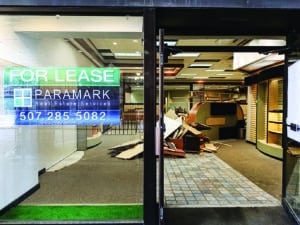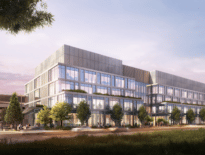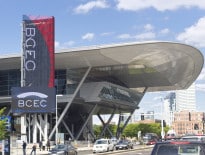A $3.5 billion economic development bill that Gov. Charlie Baker announced on Thursday looks to chart a post-pandemic pathway for Massachusetts with investments in housing, downtown revitalization and climate resilience, administration officials said.
Baker said the bill pairs the state’s remaining $2.3 billion in American Rescue Plan Act money with $1.2 billion in state bond authorizations and would direct dedicated project funding to each municipality in the state. It would steer $300 million to the Unemployment Trust Fund to address overpayments and green-light the sale of the Hynes Convention Center.
“This bill will help us adjust our downtowns to the future of work, address the housing crisis, to invest in innovation – including emerging clusters like artificial intelligence, machine learning and robotics – and position the commonwealth to capitalize on expected federal investments,” Housing and Economic Development Secretary Mike Kennealy said. “Right now in Massachusetts, there are three things we’ve never had more of: urgent needs, collaboration, and available funding.”
Energy and Environmental Affairs Secretary Kathleen Theoharides said she would argue that the bill’s $1.2 billion for climate resilience and preservation efforts “is the largest investment the state has ever put towards this kind of thing.” That pool of money includes $750 million toward the clean energy industry, $232 million to support 67 projects at parks, trails and campgrounds, $97 million for 55 coastal infrastructure projects, and $64 million for a dozen clean water projects.
Breaking It Down
Baker and other officials sketched out details of the bill at an event in Lynn, which he said would receive about $27 million under the bill. Lt. Gov. Karyn Polito said the legislation would direct at least $250,000 to each of the 351 cities and towns in Massachusetts.
Almost 250 municipalities would receive a total of $108 million in downtown recovery grants under the bill, according to Baker’s office. Those grants are part of a bucket of nearly $970 million toward downtown and community revitalization efforts, money Baker said seeks to address “one of the greatest challenges we’re going to face as a commonwealth” now that the pandemic has shifted work, commerce and recreation habits.
“How do we create the vision for every downtown, working with our colleagues in local government, our colleagues in the Legislature, and with planners and developers to deal with the fact that downtowns are going to be different?” he said. “The goal here is to make sure we make them better.”
When Baker and lawmakers last year engaged in their first go-round over how to spend some of the state’s nearly $5.3 billion ARPA allocation, the governor sought $250 million for projects aimed at revitalizing downtowns and the Legislature did not include that money in the final product they sent him last December.
When he signed that $4 billion bill containing both federal ARPA and state surplus funds, Baker also noted that it “falls far short of the investment I called for to address the housing shortage.”
Convention Center Sale, $269M for Housing
The housing components in the bill announced Thursday include $243 million in bond reauthorizations for programs around public housing, production and rehabilitation of affordable rental housing, climate resilience and transit-oriented development, along with authorization of $26 million to expand a public housing demonstration program and smart growth housing.
According to Baker’s office, the bill would also “allow the Massachusetts Convention Center Authority to sell the Hynes Convention Center, with proceeds from the sale going to affordable housing development and the Back Bay area.”
Baker in 2019 proposed selling the Hynes and using the proceeds to fund an expansion of the Boston Convention and Exhibition Center, a plan that ran into roadblocks as neighborhood groups said they had been left out of the process and lawmakers questioned if the sale of one facility should be linked to the other’s growth.
“It will be marketed to the highest acceptable proposal, and that proposal will have to have some specifics, particularly – and this was a contentious issue before – meeting, space for meetings, gatherings, recreation, performances or public use,” Massachusetts Convention Center Authority Executive Director David Gibbons said of the Hynes sale authorization at a Thursday meeting, adding that the authority would also “look to do an addition” at the BCEC in South Boston.
The National Federation of Independent Business called for quick action on a section of Baker’s bill sending $300 million in ARPA dollars to the Unemployment Insurance Trust Fund to address unemployment overpayments.
“If legislators are serious about waiving unemployment insurance overpayments, it is imperative that they support the legislation allocating the funds to pay for this gesture,” NFIB State Director Christopher Carlozzi said. “Not only should lawmakers approve the $300 million for waived UI overpayments, but they must also approve these funds as soon as possible to lower the bonding amount employers are responsible for repaying over the next decade.”
States need to commit their ARPA funds to projects by the end of 2024 and spend the money by the end of 2026. Baker said that timeline, coupled with supply chain challenges and global economic uncertainty, means “we need to get going on this now.”




 |
| 


